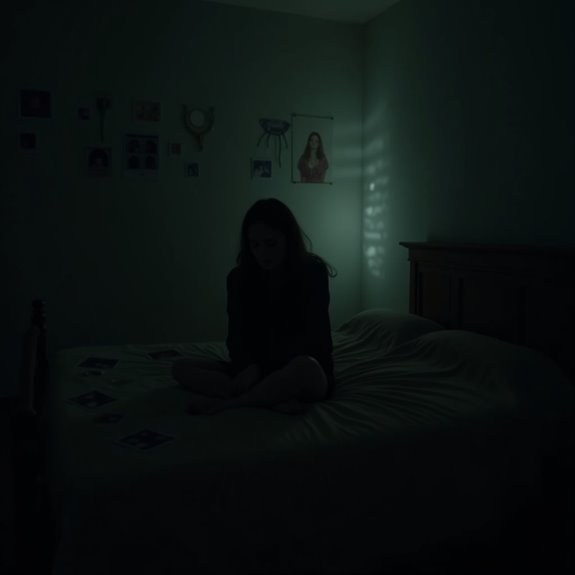Are Abduction Memories Really Screen Memories?
The phenomenon of abduction memories raises intriguing questions about their true nature. Many experts argue these recollections might serve as screen memories, concealing deeper psychological issues. They often combine surreal elements with intense emotions, blurring the line between reality and imagination. While some dismiss these accounts as mere fabrications, others see them as essential clues to unresolved trauma. Understanding whether these memories are genuine or not could reshape our perception of reality itself. What lies beneath the surface?
Introduction

While many people dismiss abduction memories as mere figments of imagination, they continue to intrigue researchers and enthusiasts alike. These memories, often described as vivid and emotionally charged, prompt questions about the nature of perception and reality. Some argue that they stem from psychological phenomena, while others contend they may represent genuine experiences. The discussions around these memories often intersect with studies on trauma, suggesting that individuals may distort or reinterpret past events. The complexity of such narratives raises the possibility of deeper explorations into the human psyche, including how beliefs and cultural influences shape recollections. As the debate unfolds, understanding abduction memories could reveal profound insights into the boundaries between memory, imagination, and possibly, the unexplained.
Memories of Alien Encounters

As individuals recount memories of alien encounters, they often describe experiences that feel undeniably real, creating a complex tapestry of emotion and detail. Many report vivid imagery of strange beings, bright lights, and feelings of awe or terror. These memories frequently merge dream-like elements with sharp, tangible sensations, leaving individuals questioning their authenticity. This conjures a sense of vulnerability as they navigate the confusion between reality and imagination. The cultural context plays an essential role, as depictions of aliens in media can shape how these encounters are perceived or recalled. Furthermore, emotions such as fear or fascination intensify the experience, leading some to believe these memories hold deeper significance. Ultimately, the subjective nature of these experiences prompts ongoing debate about their true origins.
Notable Cases or Sightings

Memories of alien encounters often spark curiosity about tangible evidence in the form of notable cases and sightings. One prominent case is the 1961 abduction of Betty and Barney Hill, where they reported a close encounter with extraterrestrials and vivid memories of their experience. Another significant sighting occurred in Phoenix in 1997, with thousands of witnesses claiming to see a series of enormous lights in a triangular formation. Similarly, the 1973 incident in Pascagoula, Mississippi, involving Charles Hickson and Calvin Parker remains infamous, as they recounted being taken aboard a craft by alien beings. These cases, among others, have encouraged further investigation into abduction phenomena, igniting discussions about the intersection of memory, experience, and perceived reality in the domain of extraterrestrial encounters.
Common Theories or Explanations
To understand abduction experiences, common theories and explanations often focus on psychological, cultural, and environmental factors. Many psychologists argue that these experiences stem from sleep paralysis, which can cause vivid hallucinations and a feeling of helplessness. Cultural influences also play a significant role; in societies where extraterrestrial narratives are prevalent, individuals may interpret ambiguous experiences as abductions. Environmental factors, such as isolation or stress, can heighten suggestibility, making memories more susceptible to distortion. Additionally, some researchers propose that these memories act as coping mechanisms for trauma or anxiety, manifesting as screen memories. By examining these interconnected elements, it becomes clear that the phenomenon of abduction stories likely stems from a complex interplay of various influences rather than objective reality.
Frequently Asked Questions
How Can I Differentiate Between Real and Screen Memories?
He differentiates between real and screen memories by analyzing emotional responses, consistency in details, and corroborative evidence. Real memories often feel vivid and persistent, while screen memories might evoke confusion or discomfort upon recollection.
What Techniques Can Enhance Memory Retrieval of Abduction Experiences?
To enhance memory retrieval of abduction experiences, individuals can use techniques like guided imagery, hypnosis, and journaling. These methods help the mind relax, allowing suppressed memories to surface while encouraging deeper reflection and exploration.
Are There Psychological Treatments for Those Distressed by Abduction Memories?
Psychological treatments like cognitive behavioral therapy and EMDR help individuals distressed by abduction memories. These approaches target trauma, easing symptoms and aiding in the processing of experiences, allowing recovery and improved coping strategies for distress.
Could Vivid Dreams Influence Perceptions of Abduction Experiences?
Vivid dreams often shape individuals’ perceptions of their abduction experiences. They can blur the lines between reality and imagination, leading some to believe their dreams reflect actual events rather than mere fabrications of the mind.
How Do Cultural Beliefs Shape Perceptions of Alien Abductions?
Cultural beliefs notably shape perceptions of alien abductions. They influence interpretations, acceptance, and descriptions, creating frameworks that people use to understand their experiences, often reflecting societal fears and expectations surrounding the unknown and extraterrestrial life.


